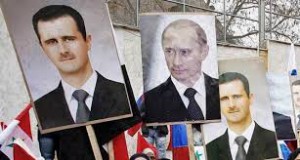Russia and Britain have been trading barbs after British Foreign Secretary Philip Hammond told Reuters he believed President Vladimir Putin was worsening the Syrian civil war by bombing opponents of Islamic State.
Hammond dismissed Russian criticism that he was spreading “dangerous disinformation”, saying there was a limit to how long Russia could pose as a promoter of the peace process while bombing Assad’s opponents, who the West hopes can shape Syria once the president is gone.
“Is Russia really committed to a peace process or is it using the peace process as a fig leaf to try to deliver some kind of military victory for Assad that creates an Alawite mini state in the northwest of Syria?” Hammond told reporters in Rome.
The comments indicate growing frustration in Western capitals about Putin’s intervention, alongside Iran, in Syria but also give a frank insight into the Western assessment of the Kremlin’s potential objectives for Syria.
When Russia began air strikes in September, Putin tilted the war in President Assad’s favour, after major setbacks earlier in 2015 brought rebel groups close to the coastal heartland of his Alawite sect.
An oppressed minority for most of their history, Alawites suddenly cemented their control in Syria in 1970 when Assad’s father Hafez staged a coup that sidelined the Sunnis. He built a ferocious security apparatus based on fellow Alawite officers.
Alawites broke away from Shi’ism more than 1,000 years ago and retain some links to it, including the veneration of Ali, the cousin and son-in law of the Prophet Mohammad. Alawi literally means “those who adhere to the teachings of Ali.”



